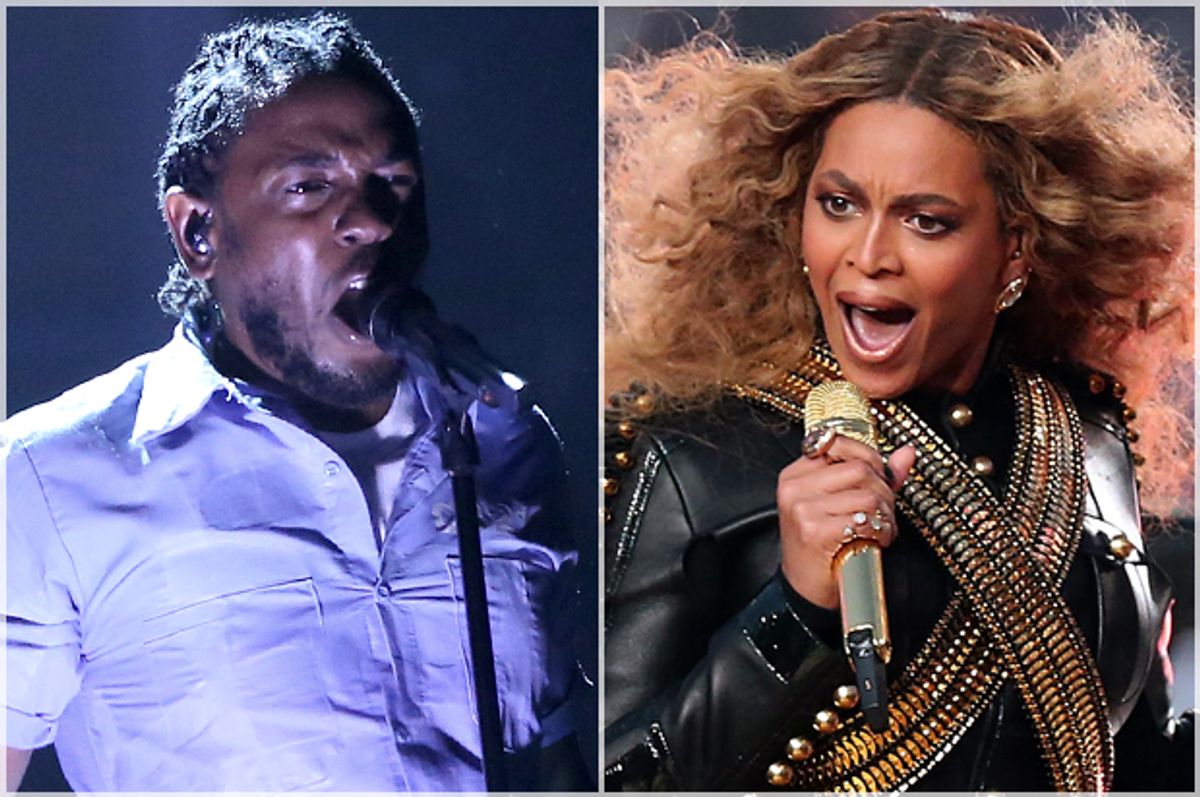Last week, Beyoncé took to the Super Bowl stage and performed the arguably "blackest" song of her career, "Formation," in which she pays homage to the Black Panthers, infamous for their denunciation of police brutality, and rejects the white beauty lens by celebrating her "negro nose with Jackson Five nostrils" and Blue Ivy's "baby hair and Afro." The morning after her performance, the Houston-bred icon's exploitation of black resistance on the most watched program in the world was the hot topic. The superstar was taken to task for the employing her blackness in both the song’s video and her half-time show to drive her brand and businesses, as one writer on Huffington Post noted how "Formation" “…just so happens to be released on the eve of her Super Bowl guest appearance ... and then there's more ... a new tour to spend your income tax refund check on!”
Last night, just eight days later, rap's reigning conscious savior, Kendrick Lamar, took to the stage of the 58th Grammy Awards to perform a medley of his songs, including the anti-establishment anthem "Alright." Lamar delivered a performance lauded for its unapologetic blackness. His performance, complete with the visual symbolism of prison uniforms, chains and African drummers covered in body paint, was an audio-visual condemnation of white supremacy — most notably, European beauty standards and police brutality. Since his and Beyoncé's performances carried nearly identical messages, this morning I awaited the think pieces analyzing the Compton-bred lyricist's exploitation of black resistance on music's biggest televised stage. I have yet to see one among the dozens praising him. Meanwhile, the Huffington Post declared Kendrick’s performance “the only one worth watching,” while CNN raved about how the “fiery performance won Grammy night.”
I suppose waiting for the critiques of Kendrick’s performance was pure cynicism. Experience taught me long ago that black women and black men are held to different and unequal standards in all things, even by each other. From the oft-cited statistic that 70 percent of children of black mothers are born out of wedlock, which places the blame at the feet of the mothers, to songs like Kanye West’s monstrously popular "Gold Digger," which paints black women seeking men of equal financial means as materialistic opportunists, black women are judged by insurmountable double standards. The difference in those standards is clearest and broadest within the rigid confines of how much of the black community defines what it means to be a conscious black woman, juxtaposed against the virtual carte blanche black men are given over their bodies, art and finances, without challenge to their commitment to black people.
Beyoncé’s fashionably revealing reinterpretation of the the Black Panther Party's look, complete with fishnets, black leather leotard and blond weave, offered stark contrast to the conservative outfits typically donned by the ladies like Angela Davis, who’ve become synonymous with the Party. While the black man’s revolutionary uniform evolved from perfectly tailored suits and pompadours, to dashikis and Afros, to baggy jeans and cornrows, the metamorphosis for the black woman’s revolutionary garb reached final form decades ago. Black men, after all, whether in Levi’s or Kinte cloth, can still declare their allegiance to blackness no matter how they're dressed.
Celebrating and embracing sensuality and fighting the revolution would seem to be mutually exclusive for the black woman, according to these double standards. So while Beyoncé’s reference in "Formation" to rewarding her man for good sex with Red Lobster precludes her from being for the revolution, Kendrick Lamar’s reference to both a threesome and rejecting capitalism within the same verse on A$AP Rocky’s "Fuckin' Problems" represents no conflict. Black men, after all, have the freedom of duality, to desire both sensual pleasure and freedom from the tools of oppression.
Beyoncé risked losing fans when she condemned the crucial threat of state-sanctioned violence against black bodies — and to her critics, this represents not the evolution of her consciousness or a pledge to uphold and defend her people, but a publicity stunt to boost sales, thus driving her further to the top of the capitalist machine, an attitude hilariously parodied in the "Saturday Night Live" sketch "The Day Beyonce Turned Black." Kendrick Lamar’s six-minute performance fervently condemned police brutality against black people on music’s premiere awards show, where performances are directly responsible for immediate spikes in album sales — and this makes him a revolutionary. Black men, after all, are bold and heroic to stage performances expressing black rage in white spaces.
Beyoncé's "Formation" seeks to destroy not only white supremacy, but also the black patriarchy, which tells us that free black women — like a bootylicious, booty-shaking, scantily clad, international pop star — cannot be a part of the revolution. Romanticized and fanatical as it may seem, Beyoncé in skimpy clothes on the Super Bowl halftime stage represents a resistance to oppression without respect to whom the oppressor may be. While Kendrick Lamar’s performance represent a powerful resistance as well, one can’t help but notice that his fight is only against structural racism — ignoring the misogynoir that keeps black women oppressed in both our blackness and womanhood.

Shares